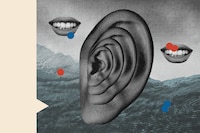
I also feel uncomfortable with how he uses language used to bring women down, like “witch” with a b and “slut.” The other bridesmaids find him charming and delightful; they have even said that they are so glad there is “a gay” in the wedding. I never thought of myself as such a stick in the mud until now, but I just do not click with him.
Beside this wedding, I’m going to see Charlie a lot as our families come together so I’m going to have to learn to deal with him. Do I just ignore it when he talks bluntly about weight? Let it go when he calls me a witch? Or is there a way I can ask him to check it a little without coming across as a homophobe?
— Bridesmaid
Follow Damon Young
FollowBridesmaid: So, let’s just get this out of the way: I’d worry less, if I were you, about “coming across” as a homophobe and more about “being a homophobe.” Because you are one.
Now, homophobia, like every other bias, exists on a spectrum. You have your violent homophobes, who use excuses like religion, their concept of morality, or their complicated feelings about their own sexuality, to perpetuate hate. Nothing from your letter indicates I’m describing you.
Then there are people who perhaps don’t carry any conscious personal animus toward queer people, but have internalized negative and reductive stereotypes about them, and I think this is where you exist. To be clear, I’m not suggesting you have some homophobic tendencies just because you’re off-put by your soon-to-be brother-in-law’s behavior. Instead, I’m saying it’s because you believe he’s acting like a “stereotypical gay man,” when there is no such thing.
It feels … rudimentary to even type this out, but not every gay man is like Nathan Lane in “The Birdcage.” Some are. Most aren’t. The behavior you have a problem with isn’t “gay male” behavior. From your description, he is a habitual boundary-stepper who also just happens to be gay. You are perfectly justified to tell him his language and his comments about your fashion sense have offended you. This doesn’t have to be a big production, either. Just call him on the phone or invite him to coffee and talk to him.
And who knows? Maybe this’ll be a bonding moment for you two. It’s not uncommon for people who’ve had underwhelming first impressions of each other to become close after getting real. But even if that’s not in the cards for you, you have to get past this anachronistic stereotype, for the queer people you happen to meet, and for your own well-being.
Good luck.








